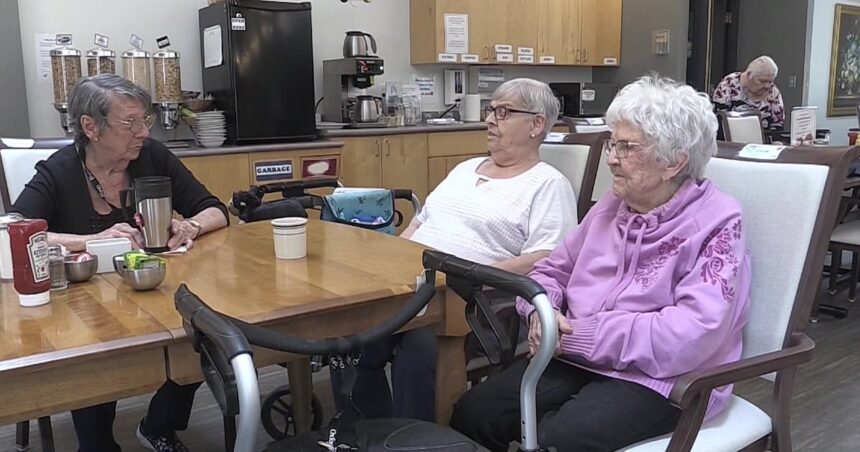I arrived at the 50+ Centre in downtown Sudbury just as morning light filtered through the large windows. About twenty seniors sat in a circle, some clutching coffee cups, others leafing through handouts. The room hummed with quiet conversation, punctuated by occasional laughter.
“I never thought I’d be talking about mental health at my age,” confided Elaine Gravelle, 73, settling into a chair beside me. “In my day, we just called it ‘having nerves’ and carried on.”
Across Northern Ontario, seniors like Gravelle are breaking decades of silence around mental health through community workshops specifically designed for older adults. The initiative, launched by the Canadian Mental Health Association’s Sudbury-Manitoulin branch, aims to address what many health advocates call an invisible crisis among Canada’s aging population.
“We’ve been raised to be stoic, to not complain,” explains Dr. Venera Bruto, a geriatric psychiatrist with Health Sciences North who consults on the program. “Many seniors were taught that discussing psychological struggles was taboo or a sign of weakness. This generational perspective creates significant barriers to seeking help.”
Those barriers have real consequences. According to Statistics Canada, adults over 65 have among the highest suicide rates in the country, particularly men over 85. Yet seniors remain the least likely demographic to seek mental health support, with only one in three older adults with mental health issues receiving treatment.
The workshops, held weekly at various community centers throughout Sudbury, cover topics ranging from depression and anxiety to grief, isolation, and adapting to physical changes. What makes them unique is their deliberate approach to addressing mental health through the specific lens of aging.
Raymond Landry, 81, a retired miner who lost his wife two years ago, has attended six sessions. “They don’t talk down to us or use all that therapy jargon,” he says, tapping a weathered finger on his notebook. “They understand that our issues are different. Losing friends every month, feeling useless after retirement, worrying about becoming a burden – these aren’t just ‘sad thoughts.’ They’re our daily reality.”
The program’s success lies partly in its integration with familiar community spaces. Rather than requiring seniors to navigate the formal healthcare system – which many find intimidating – the workshops come to them, meeting in senior centers, church basements, and libraries across the region.
“We’ve embedded these conversations in places where seniors already feel comfortable,” explains Miranda Campbell, coordinator of the program. “The familiarity removes one more barrier to participation.”
Campbell notes that attendance has steadily increased since the program launched last spring, with nearly 300 seniors participating across the region. The initiative now has a waiting list at several locations.
The workshops employ evidence-based approaches adapted for older adults, including cognitive behavioral techniques, mindfulness practices, and peer support models. A key component involves helping participants distinguish between normal aging and actual mental health conditions.
“Many seniors dismiss depression symptoms as just ‘getting old,'” says Campbell. “We help them understand the difference between occasional sadness and clinical depression, between normal forgetfulness and cognitive decline.”
This distinction proved crucial for Gravelle, who realized during a workshop that her persistent low mood, sleep changes, and loss of interest weren’t inevitable aspects of aging but treatable symptoms of depression.
“I thought feeling this way was just part of getting older,” she admits. “Learning that it wasn’t – and that I deserved help – was like someone turning on a light.”
The Canadian Mental Health Association’s approach draws from research published in the Canadian Journal of Psychiatry showing that age-specific mental health interventions yield better outcomes for seniors than general programs. A 2022 study from the University of British Columbia found that older adults who participated in age-appropriate mental health workshops showed significant improvement in symptoms and were more likely to seek additional support when needed.
Beyond addressing individual mental health, the workshops have fostered community connections among participants. Many seniors report that the social aspects of the program have become equally important to the formal content.
“I come for the mental health information, but I stay for the people,” says Landry, gesturing toward two other men he now meets weekly for coffee outside the program. “When my wife died, my world shrank to the size of my apartment. These sessions pulled me back into life.”
The program has not been without challenges. Initial recruitment proved difficult, with organizers noting that the stigma they were trying to address also prevented many seniors from attending. Transportation issues in Sudbury’s sprawling geography presented another hurdle, particularly during winter months.
In response, organizers partnered with a local volunteer driving service and began offering virtual options for those unable to attend in person. They also reframed marketing materials, removing clinical terminology and emphasizing social connection alongside mental wellness.
As the morning session wraps up, participants linger, exchanging phone numbers and making lunch plans. Campbell watches with satisfaction, noting that these spontaneous connections often provide as much therapeutic benefit as the structured content.
“Mental health care isn’t just clinical intervention,” she reflects. “For many seniors, it’s also about restoring purpose and community – elements often lost in later life.”
The Sudbury program has drawn attention from other Northern Ontario communities, with similar initiatives now launching in Timmins and Thunder Bay. Health Sciences North is currently evaluating the program’s effectiveness with plans to present findings to the Ontario Ministry of Health later this year.
For seniors like Gravelle, the impact is already clear. “I finally understand that my mental health matters at every age,” she says, gathering her things as the session ends. “And more importantly, I’m not alone in figuring it out.”






